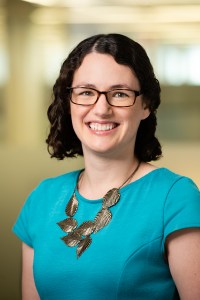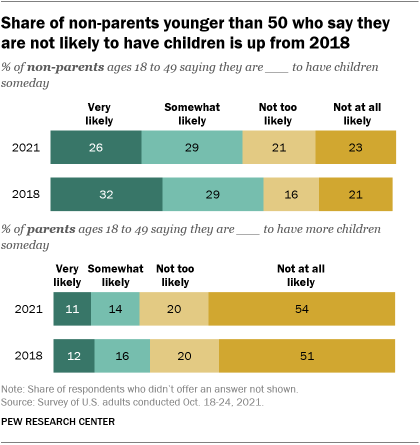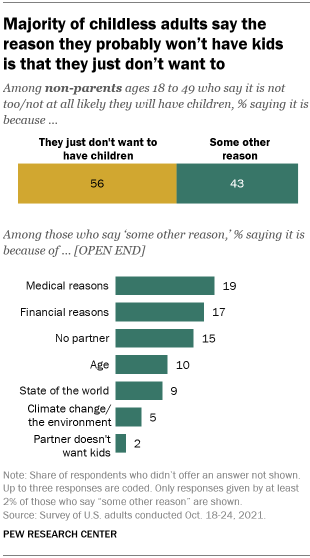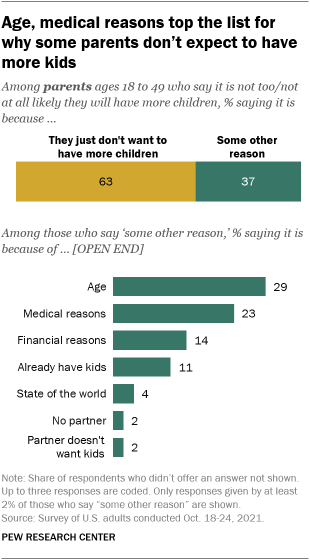Birth rates in the United States dropped during the COVID-19 pandemic amid the twin public health and economic crises, lending evidence to predictions from early on in the outbreak that economic uncertainty might trigger a baby bust. This continued the downward trend in U.S. fertility rates, which were already at a record low before the pandemic began.
A new Pew Research Center survey finds that a rising share of U.S. adults who are not already parents say they are unlikely to ever have children, and their reasons range from just not wanting to have kids to concerns about climate change and the environment.
Pew Research Center conducted this study to learn more about Americans who don’t expect to have children in the future and the reasons they give.
This analysis is based on 3,866 U.S. adults ages 18 to 49, collected as a part of a larger survey conducted Oct. 18-24, 2021. Everyone who took part is a member of the Center’s American Trends Panel (ATP), an online survey panel that is recruited through national, random sampling of residential addresses. This way, nearly all U.S. adults have a chance of selection. The survey is weighted to be representative of the U.S. adult population by gender, race, ethnicity, partisan affiliation, education and other categories. Read more about the ATP’s methodology.
Here are the questions used for this post, along with responses, and its methodology.
Some 44% of non-parents ages 18 to 49 say it is not too or not at all likely that they will have children someday, an increase of 7 percentage points from the 37% who said the same in a 2018 survey. Meanwhile, 74% of adults younger than 50 who are already parents say they are unlikely to have more kids, virtually unchanged since 2018.
Among parents and non-parents alike, men and women are equally likely to say they will probably not have kids (or more kids) in the future. Perhaps not surprisingly, adults in their 40s are far more likely than younger ones to say they are unlikely to have children or to have more children in the future. Some 85% of non-parents 40 to 49 say this, compared with 37% of those younger than 40. And while 91% of older parents say they probably won’t have more kids, 60% of younger parents say the same.
A majority (56%) of non-parents younger than 50 who say it’s unlikely they will have children someday say they just don’t want to have kids. Childless adults younger than 40 are more likely to say this than those ages 40 to 49 (60% vs. 46%, respectively). There are no differences by gender.
Among childless adults who say they have some other reason for thinking they won’t have kids in the future, no single reason stands out. About two-in-ten (19%) say it’s due to medical reasons, 17% say it’s for financial reasons and 15% say it’s because they do not have a partner. Roughly one-in-ten say their age or their partner’s age (10%) or the state of the world (9%) is a reason they don’t plan to have kids. An additional 5% cite environmental reasons, including climate change, and 2% say their partner doesn’t want children.
When it comes to 18- to 49-year-old parents who say they are unlikely to have more children in the future, again a majority (63%) say it’s because they just don’t want to. Fathers (69%) are more likely to say this than mothers (59%), as are parents younger than 40 (71%) when compared with those 40 to 49 (57%).
Among those younger than 50 who say there was some other reason why they probably will not have more children, age (theirs or their partner’s) and medical reasons were among the top reasons why (29% and 23% of this group said so, respectively), followed by financial reasons (14%) and the fact that they already have kids (11%). Smaller shares cite the state of the world (4%), not having a partner (2%) or having a partner who doesn’t want kids (2%).
Mothers and fathers generally give similar reasons for saying it’s unlikely they will have more children, but mothers are more likely than fathers to mention medical reasons (27% vs. 16%), while fathers are more likely than mothers to cite already having kids (18% vs. 6%).
About a quarter of parents younger than 40 who don’t expect to have more children in the future cite financial reasons (26%), compared with 8% of those 40 to 49. The younger group is also more likely to mention not having a partner (6% vs. 1%), while older parents are more likely to say age is a reason why they don’t expect to have more kids (41% of those 40 to 49 vs. 5% of those younger than 40).
Note: Here are the questions used for this post, along with responses, and its methodology.






